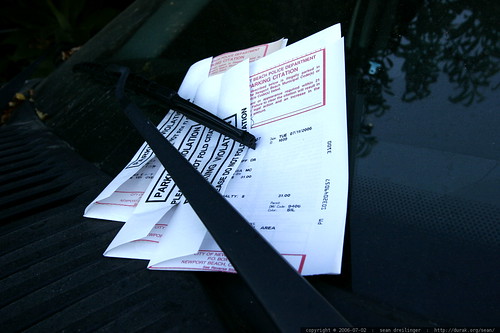
(Reposted from my Causecast Blog. I wasn't going to post here, but I gotta bulk this thing up somehow.)
I found this article on free parking very fascinating (okay, reading that sentence again really does sound as crazy I thought it would).
The Montreal Gazette (as forwarded me via Mr. Bennett's tweet), writes about the cost of providing a free parking spot in terms of how we should be looking at it from a city-developing scale. Hardly exciting, but worth some valid thought. Residents living in cities feel they are entitled to affordable parking, or that by some law there must be SOME sort of free parking somewhere.
Growing up in Santa Barbara, I was raised to believe that parking in garages was always very cheap, and for the cost of slight inconvenience, you can park for free on a sidestreet. Paid parking in Goleta is unheard of. But going to school in Savannah GA, there is not a single free parking spot in the whole city. And ontop of meters at every spot, there's street sweeping to boot. Needless to say, I got more parking tickets than A's (I was a straight A student, of course, but I got a lot of parking tickets). However because each ticket was $12 or less, it was just an irritating part of life. Moving to Los Angeles after that, the tickets are $52 each, so getting a parking ticket means you have to wait until next week to buy groceries.
The fact is a car is a tremendous amount of space. The article describes how developers for banquet halls in Richmond, B.C. are required to provide up to four square meters of parking per every meter of hirable banquet space. Grocery stores have to sacrifice half of their property or more for empty pavement. And there's no efficiency equation involved: how many customers carpool?
But of course this is a loss-leader: how many would shop at a store that you had to pay to park? The cost of property taxes in this empty space is made up for in sales. But the problem is this completely discourages alternative transportation. Stuart Donovan and David Seymour, the authors of the article, describe how this taxation (paying for parking in the merchandise you buy) is more expensive for low-income customers who do not take advantage of the free parking by riding the bus. There is warrant to that argument, but admittedly it really stretches the case.
The problem I don't think is addressed is alternatives. First, how many customers know about this? It's something that's very obvious, but not really noticed because we take it for granted. How large of a percentage of our bill goes toward parking, let alone gas and the cost of owning a car at all? Second, how about adding an incentive to not driving or carpooling? A lot of stores already offer a $.05 discount for every reusable bag you use for your groceries (instead of using their plastic bags). How about deducting $1 if the person brings in a bus voucher?
But unfortunately solutions won't come anytime soon. Grocery stores, or any stores for that matter, are only concerned with massive amount of customers making even more massive amounts in purchases, and making the matter difficult or appear more expensive to the customer will only scare them away. Probably the best solution is just informing the customer via posters and printing on the receipt (but then I guess that would leave the next campaign to be about saving paper.)
No comments:
Post a Comment